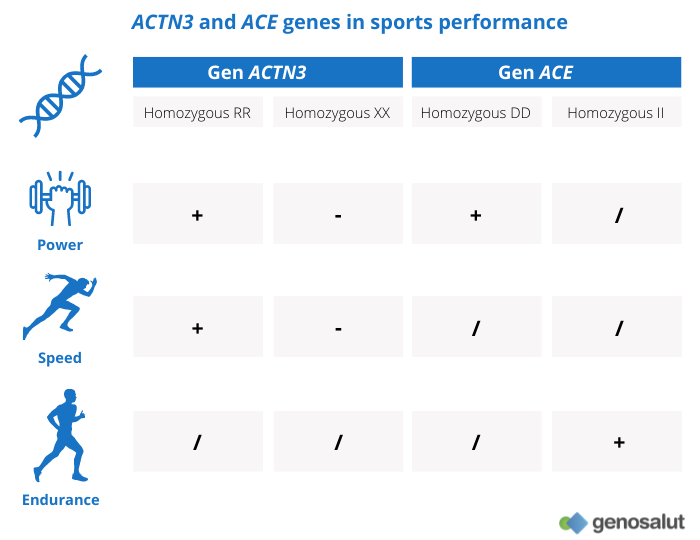We will all have experienced it, the classmate who excelled in all sports. He or she stood out for speed, endurance, coordination and so many other sporting skills. And we’ve all wondered, is it heredity, is there really such a thing as “sport genes”? In this article, we will address this very question and you will discover how our genes influence our sporting performance.
How much does genetics influence sports performance?
There is no definitive answer, as experts do not agree on the importance of genes in sports performance. However, most of them do attribute an important weight to genes, which they place at between 30% and 70%.
The influence of genes can also be variable in each of the sporting skills. For example, some studies suggest that genetics is important in terms of aerobic endurance, speed, agility and reaction capacity.
Variations in our DNA determine how our body responds to training
Human beings differ in our DNA. These differences, known as genetic polymorphisms, are the reason why we react differently to certain stimuli, such as sport. More than 200 polymorphisms are currently known to be associated with physical performance and more than 20 of these are associated with peak sporting performance. Two genes are particularly known to influence our physical performance: ACTN3 and ACE.
ACTN3: speed and power
The ACTN3 gene encodes the sarcomeric α-actinin-3 protein in skeletal muscle fibres. The expression of α-actinin-3 protein is restricted almost exclusively to fast, glycolytic, 2X-type fibres, which are responsible for producing an “explosive” and powerful contraction.
There is a polymorphism in this gene, R577X, which numerous studies have associated with sports performance, specifically power and speed. Humans can be:
● Homozygous for variant X (XX), i.e. both our father and mother have passed on to us a copy that includes this polymorphism.
● Heterozygotes (XR), when we have inherited a different variant from each parent.
● Homozygous for the R variant (RR), when our father and mother have passed on a copy that includes this polymorphism.
People who are homozygous XX (approx. 18% of humans worldwide) in the ACTN3 gene have a complete deficiency of the α-actinin-3 protein and lower performance in tests related to power and speed. In contrast, the ACTN3 RR genotype has been associated with high performance in speed and power in elite athletes. In summary, it appears that α-actinin-3 deficiency is detrimental to fast muscle performance in sprint and power disciplines.

ACE: power or endurance
Another candidate gene associated with elite performance is the ACE gene. The protein it synthesises, angiotensin-converting enzyme, in addition to regulating blood pressure, influences skeletal muscle function.
The enzyme catalyses the conversion of angiotensin I to angiotensin II. This hormone is not only a more potent vasoconstrictor but also a muscle growth factor involved in overload-induced muscle hypertrophy.
ACE gene polymorphism is defined by the presence (insertion, allele I) or absence (deletion, allele D) of a 287 bp fragment. Thus, there are three variants: homozygous II, heterozygous ID and homozygous DD, whose distributions within a Caucasian population are approximately 25%, 50% and 25% respectively.
Studies seem to indicate that the D allele is associated with elite power-oriented athletic performance, perhaps through an angiotensin II-mediated increase in muscle growth and strength. Conversely, a local increase in muscle efficiency, rather than a central cardiorespiratory effect, contributes to the increased endurance associated with the I allele.
Sporting aptitude, a question of will or predisposition?
After all this, the question inevitably arises: Can we conclude that our abilities, strengths and weaknesses ultimately depend on genes? The answer is not simple. The field of genetics is extremely complex and there is still a long way to go.
Athletic performance depends on the luck of having inherited good genes and also on many hours of hard training.
In most cases, the combination of good genetic conditions with the right training plan and dedication is often the secret to success. But identifying the individual’s own strengths is the first step… Here genetics plays a very important role! The GenoSport sports genetic test helps athletes to get to know themselves better, helping them to identify their strengths and weaknesses at a genetic level, with the aim of personalising diets and training and avoiding injuries.
If you like our blog, subscribe to our newsletter


